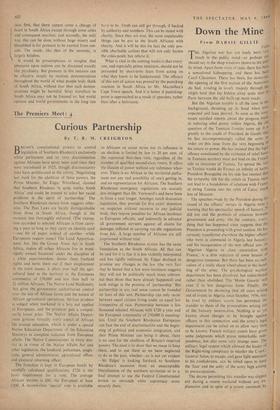The Premiers Meet: 4
Curious Partnership
By T. R. M. CREIGHTON
BRITAIN% constitutional powers to control legislation of Southern Rhodesia's exclusively white parliament and to veto discrimination against Africans have never been used since they were introduced in 1923, though discriminatory laws have proliferated in the colony. Negotiating last week for the abolition of these powers, the Prime Minister, Sir Edgar Whitehead, claimed that Southern Rhodesia is quite unlike South Africa' and could be trusted to solve her racial problems in the spirit of 'partnership.' The Southern Rhodesian statute book suggests other- wise. The Pass Laws are barely distinguishable from those in South Africa, though at the moment less thoroughly enforced. (The exemp- tion accorded to selected Africans is from carry- ing a pass so long as they carry an identity card ----one bit of paper instead of another—while Europeans require none.) The Land Apportion- ment Act, like the Group Areas Act in South Africa. makes all urban Africans live in muni- cipally owned locations' under the discipline of a white superintendent, denies them freehold rights and turns them out if their employment in the town ceases; it allots over half the agri- cultural land in the territory to the European community of 250,000 and less than half to 21 million Africans. The Native Land Husbandry Act gives the government authoritarian control over the size of African farms and the nature of African agricultural operations. African produce is subject when marketed to a levy not applied to Europeans, and the producer gets a compul- sorily lower price. The Native Affairs Depart- . ment governs virtually every aspect of African life (except education, which is under a special Native Education Department of the Education Ministry) in complete Isolation from European affairs. The Native Commissioner in every dist- rict is, in virtue of the Native Affairs Act and other legislation, the landlord, policeman, magis- trate, general administrator, agricultural officer and electoral returning officer. - The franchise is kept in European • hands by carefully calculated qualifications. £720 is the basic requirement for a vote. The average African income is £80, the European at least £900. A second-class *special' vote is available to Africans on easier terms but its influence in an election is limited by law to 20 per cent. of the registered first-class vote, regardless of the number of qualified second-class voters. It offers the illusion of power without any substance what- ever. There is no African in the territorial parlia- ment nor any real possibility of one's getting in, and no representation for Africans. The Southern Rhodesian emergency regulations are scarcely less stringent than Dr. Verwoerd's and have been in force a year longer. Amongst much draconian legislation, they provide for five years' detention on suspicion without recourse to any judicial body, they impose penalties for African insolence to European officials; and indemnify in advance all government servants against all claims for damages inflicted in carrying out the regulations bona fide. A large number of Africans are still imprisoned without trial..
The Southern Rhodesian system has the same foundation as the South African. All that can be said for it is that it is less violently interpreted and less rigidly enforced. Sir Edgar declined to promise any changes in the law (the very fact that he hinted that a few were imminent suggests they will not be politically much more substan- tial than those that have already happened) and took refuge in the promise of 'partnership.' But partnership in any real sense cannot be founded on laws of this sort. Partnership can only occur between equal citizens living under an equal law irrespective of race. Partnership between a few thousand selected Africans with £720 a year and the European community of 250;000 is meaning- less. Until the Southern Rhodesian Europeans can face the end of discrimination and the begin- ning of political and economic integration, and their Prime Minister can bring it about, there is no case for the abolition of Britain's reserved powers. The need is to show that we mean to keep them, and to use them as we have neglected to do in the past, whether—as is not yet evident —Sir Edgar is looking forhard to Southern Rhodesia's secession from an unacceptable liberalisation of the northern territories or to a final attempt to use the Federal Constitutional review to entrench white supremacy more securely there.






































 Previous page
Previous page